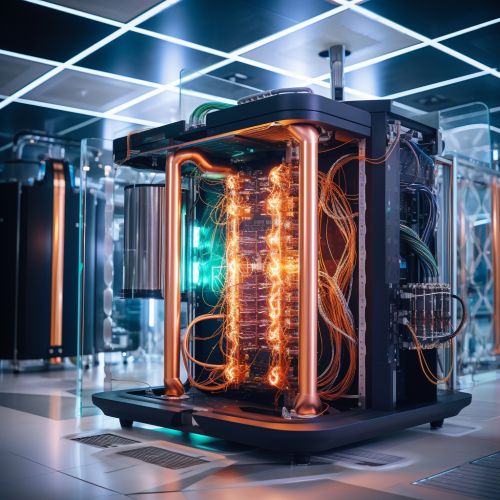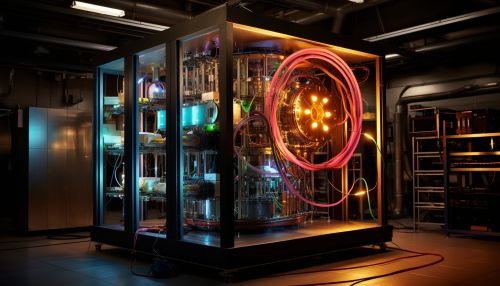Quantum Computing with Quantum Communication Channels
Introduction
Quantum computing is a field of study that focuses on the development and application of computers based on the principles of quantum theory. Quantum theory explains the nature and behavior of energy and matter on the quantum (atomic and subatomic) level. Quantum computing uses quantum bits, or "qubits", which can be in multiple states at once, thanks to the principle of superposition. This allows quantum computers to process a higher number of data possibilities than traditional computers.


Quantum Bits (Qubits)
In classical computing, a bit is a single piece of information that can exist in two states – 1 or 0. Quantum computing utilizes quantum bits, or "qubits". A qubit can exist not only in a state corresponding to the logical state 0 or 1 as in a classical bit, but also in states corresponding to a blend or superposition of these classical states. In other words, a qubit can exist in any proportion of both states at once, a property which is fundamental to quantum computing.
Quantum Superposition
Superposition is a fundamental principle of quantum mechanics that allows particles to exist in multiple states at once. This means that a qubit can represent zero, one, or both at the same time. When a quantum system is in a state of superposition, the exact state of the system is unknown until it is measured. This property allows quantum computers to manipulate large combinations of states at once.
Quantum Entanglement
Quantum entanglement is another key principle of quantum mechanics that quantum computers take advantage of. It is a phenomenon where two qubits become linked, such that the state of one qubit is directly related to the state of the other, no matter the distance between them. This property is used in quantum computing to link qubits in a process called quantum teleportation.
Quantum Gates
Quantum gates are the basic building blocks of quantum circuits. They operate on a small number of qubits, changing their quantum states in various ways. Unlike classical logic gates, quantum gates can be reversible. Some common quantum gates include the Pauli-X, Y, and Z gates, the Hadamard gate, and the Phase gate.
Quantum Circuits
A quantum circuit is a sequence of quantum gates. Quantum circuits are used to perform quantum computations. Like classical computer circuits, quantum circuits consist of wires and elementary quantum gates, but unlike classical circuits, quantum circuits can also contain quantum bits in superposition states.
Quantum Algorithms
Quantum algorithms are a set of instructions to perform a task on a quantum computer. They take advantage of quantum superposition and entanglement to perform computations more efficiently than classical computers. Some well-known quantum algorithms include Shor's algorithm for factoring and Grover's algorithm for search.
Quantum Communication Channels
Quantum communication channels are used to transmit quantum information between locations. They take advantage of quantum entanglement and superposition to transmit information more securely and efficiently than classical communication channels. Quantum key distribution (QKD) is a secure communication method which implements a cryptographic protocol involving components of quantum mechanics.
Quantum Error Correction
Quantum error correction is a set of techniques for correcting errors that occur in quantum computers. Due to the fragile nature of quantum information, error correction is a critical part of any practical quantum computer.
Quantum Computing Applications
Quantum computers have potential applications in many fields. In cryptography, quantum computers could potentially break many of the systems currently in use. In material science and chemistry, quantum computers could simulate complex molecules and reactions, leading to the discovery of new materials and drugs. In machine learning, quantum computers could potentially speed up data analysis and pattern recognition.
